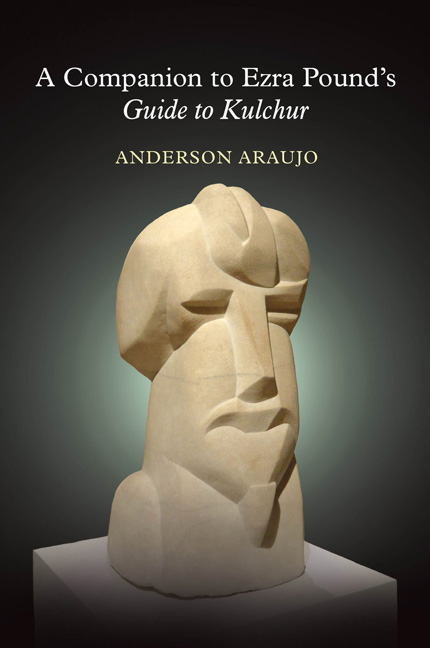Book contents
- Frontmatter
- Contents
- Acknowledgments
- Abbreviations
- Introduction
- Guide to Kulchur
- Part I
- Section I
- Section II
- Part II
- Section III
- Section IV
- Part III
- Section V
- 15 Values
- 16 Europe Or The Setting
- 17 Sophists
- 18 Kulchur: Part One
- 19 Kulchur: Part Two
- 20 March 12th
- 21 Textbooks
- Section VI
- Part IV
- Section VII
- Section VIII
- Section IV
- Part V
- Section X
- Section XI
- Part VI
- Section XII
- Section XIII
- Addenda: 1952
- Notes
- Index
15 - Values
from Section V
- Frontmatter
- Contents
- Acknowledgments
- Abbreviations
- Introduction
- Guide to Kulchur
- Part I
- Section I
- Section II
- Part II
- Section III
- Section IV
- Part III
- Section V
- 15 Values
- 16 Europe Or The Setting
- 17 Sophists
- 18 Kulchur: Part One
- 19 Kulchur: Part Two
- 20 March 12th
- 21 Textbooks
- Section VI
- Part IV
- Section VII
- Section VIII
- Section IV
- Part V
- Section X
- Section XI
- Part VI
- Section XII
- Section XIII
- Addenda: 1952
- Notes
- Index
Summary
Brancusi in some dimensions a saint: Cf. note GK 59.
Picabia a brilliant intellect: Writing to John Quinn from Paris in May 1921, Pound says, “Picabia is alive, but as a thinker.” In 1937, he singles out Picabia “as the only man I have ever met who has a genius for handling abstract concepts with the ease and surety a chartered accountant would have with a bill (ordinary) of lading.”
Gaudier had and Cocteau has genius: In Gaudier-Brzeska, Pound defines the sculptor's genius as “an abnormal sympathy with, an intelligence for, all moving animal life, its swiftness and softness.” In 1935, in an article for the New English Weekly, Pound affirms that “Cocteau has the freest mind, and the purest, in Europe.” In the Criterion of July 1937, Pound dubs Cocteau “the live writer in France” and, alongside Picabia and Wyndham Lewis, one of the “lively minds meeting a common need of the period.”
Mussolini a great man: Benito Mussolini (1883–1945), Italian Fascist dictator. That Mussolini follows Brancusi, Picabia, Gaudier, and Cocteau in Pound's list of genius-artists may seem odd, but it should come as no surprise. In the section “Dictatorship as a Sign of Intelligence” of his ABC of Economics (1933), Pound declares that “Mussolini as intelligent man is more interesting than Mussolini as the Big Stick. The Duce's aphorisms and perceptions can be studied apart from his means of getting them into action.” His meeting with Mussolini in the Palazzo Venezia in Rome on January 30, 1933 marked a milestone in the poet's affiliation with Italian Fascism and, more specifically, in his full-fledged conversion to the dictator's cult of personality or mussolinismo.7 The brief tete-a-tete made a lasting impression on Pound. Nearly every rhetorical gesture in his writings from this point onward would bear the stripes of this encounter. In a famously revealing moment of self-referentiality, Canto 41 registers Mussolini's amused appraisal of A Draft of XXX Cantos (1930), a copy of which the ruler is said to have held in his hand when Pound entered the imposing Hall of the Mappa Mundi where he kept his desk,
MA QVESTO,”
said the Boss,
“e divertente.”
catching the point before the aesthetes had got
there; (41/202)
- Type
- Chapter
- Information
- A Companion to Ezra Pound's Guide to KulcherGuide to Kulcher, pp. 142 - 145Publisher: Liverpool University PressPrint publication year: 2018

